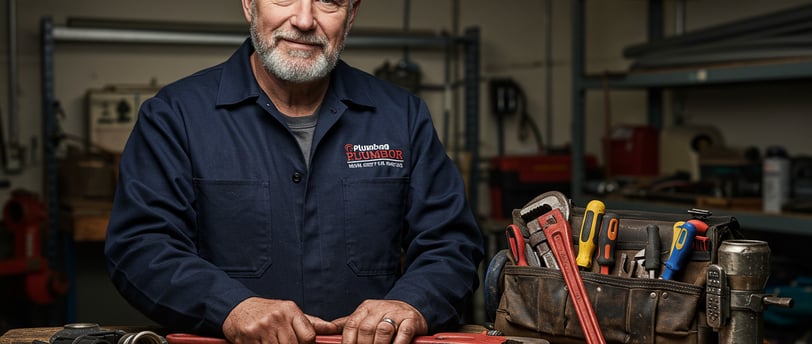Hiring a Plumber? What You Need to Know
How to navigate the process of hiring a plumbing contractor and make an informed decision.
HOME UPGRADESHIRINGPLUMBING
2/20/20255 min read


Plumbing projects, whether big or small, often require the expertise of a professional. A simple leak might seem like a quick fix, but without proper knowledge, tools, and experience, even minor plumbing tasks can escalate into costly and time-consuming issues. If you're considering hiring a plumber, here's everything you need to know.
1. Understanding the Role of a Plumbing Contractor
A plumbing contractor is a professional who specializes in installing, repairing, and maintaining plumbing systems. They work on various projects, including fixing leaks, installing new pipes, and maintaining water heaters. Some plumbing contractors also offer services related to gas lines, sewage systems, and drainage solutions. Unlike general plumbers, who typically handle minor repairs and maintenance, plumbing contractors are equipped to work on large-scale projects and complex plumbing installations.
2. Licensing and Certifications
One of the first things you should check when hiring a plumbing contractor is their licensing and certification. Most states and municipalities require plumbers to be licensed, ensuring they have met the necessary training and qualifications. A licensed plumber has completed extensive coursework and hands-on training to understand plumbing codes, safety regulations, and best practices.
To verify a contractor’s license, you can check with your local licensing board or use online databases provided by your state’s regulatory agency. Additionally, some plumbing contractors hold certifications from professional organizations such as the Plumbing-Heating-Cooling Contractors Association (PHCC) or the National Inspection Testing and Certification Corporation (NITC), which indicate a higher level of expertise.
3. Experience and Specializations
Experience plays a critical role in a plumbing contractor’s ability to handle complex issues effectively. While newer contractors may offer competitive pricing, a more experienced professional will have a proven track record of handling various plumbing challenges. Ask about their experience with projects similar to yours and inquire about their areas of specialization.
For instance, some plumbing contractors focus primarily on residential plumbing, while others specialize in commercial or industrial projects. If you need a plumber for a specific task, such as repiping an old home or installing a tankless water heater, look for a contractor with expertise in that area.
4. Insurance and Liability Coverage
Before hiring a plumbing contractor, verify that they have adequate insurance coverage. A reputable plumber should have both general liability insurance and worker’s compensation insurance. These policies protect both you and the contractor in case of accidents, injuries, or property damage during the job.
If a plumbing contractor lacks insurance and an accident occurs on your property, you could be held liable for medical expenses and damages. Always request proof of insurance and ensure the coverage is active before signing any contracts.
5. Reputation and References
Checking a contractor’s reputation is one of the best ways to ensure you hire a reliable professional. Start by reading online reviews on platforms such as Google, Yelp, and the Better Business Bureau (BBB). Look for patterns in customer feedback—consistent complaints about poor workmanship or missed deadlines are red flags.
Additionally, ask the contractor for references from past clients. A reputable plumber should be able to provide at least three references. Contact these references to ask about their experience with the contractor, including the quality of work, professionalism, and timeliness.
6. Pricing and Estimates
Pricing is an important factor when hiring a plumbing contractor, but it should not be the sole deciding factor. While it’s tempting to choose the lowest bid, cheaper services may result in subpar work that leads to costly repairs later on.
Request written estimates from at least three contractors to compare pricing and services. Be wary of contractors who provide quotes over the phone without inspecting the job site. A reliable plumber will conduct an on-site assessment before giving an accurate estimate.
Ensure the estimate includes a breakdown of costs, including labor, materials, permits, and any potential additional charges. Avoid vague pricing structures, and ask about any hidden fees that might arise during the project.
7. Contracts and Agreements
Never start a plumbing project without a written contract. A well-drafted contract should include the scope of work, materials to be used, project timeline, total cost, payment schedule, and warranty details. This document protects both you and the contractor by clearly outlining expectations and responsibilities.
If a contractor is unwilling to provide a written contract, consider it a red flag. Verbal agreements can lead to misunderstandings and disputes, leaving you vulnerable to unexpected costs or unfinished work.
8. Warranties and Guarantees
A reputable plumbing contractor should stand behind their work by offering warranties on labor and materials. Ask about the warranty coverage before hiring a plumber.
Manufacturers typically provide warranties on plumbing fixtures and materials, but the contractor should also guarantee their workmanship. A warranty ensures that if any issues arise after the job is completed, the contractor will return to fix them at no additional cost.
9. Permits and Code Compliance
Certain plumbing projects require permits and must comply with local building codes. Failing to obtain the necessary permits can lead to fines and problems when selling your home in the future. A qualified plumbing contractor should be familiar with local regulations and obtain permits on your behalf when needed.
Before starting the project, ask the contractor about necessary permits and ensure they are handling the application process. If they suggest bypassing permits to save money, it’s a sign of an unprofessional and potentially dishonest plumber.
10. Emergency Services and Availability
Plumbing emergencies can happen at any time, so it’s beneficial to hire a contractor who offers emergency services. Burst pipes, severe leaks, and sewage backups require immediate attention to prevent water damage and health hazards.
Before hiring a plumber, inquire about their availability for emergency repairs and their response time. Some contractors provide 24/7 emergency services, while others may have limited availability outside of regular business hours.
11. Communication and Professionalism
Effective communication is key to a smooth plumbing project. A professional plumber should be responsive, courteous, and willing to answer your questions. Pay attention to their punctuality, willingness to explain technical details, and overall professionalism.
If a contractor is difficult to reach, provides vague answers, or lacks transparency, it may indicate future problems. Choose a plumber who values clear communication and customer service.
12. Red Flags to Watch Out For
While there are many trustworthy plumbing contractors, some may try to take advantage of unsuspecting clients. Be cautious of the following red flags:
Unlicensed or uninsured contractors
Extremely low bids that seem too good to be true
Pressure to make an immediate decision
Lack of written contracts or vague pricing
Negative online reviews and unresolved complaints
Requests for full payment upfront
If you encounter any of these warning signs, consider looking for another contractor.
Hiring a plumbing contractor requires careful research and due diligence. By considering factors such as licensing, experience, insurance, pricing, and warranties, you can ensure you choose a qualified professional who will complete the job correctly and efficiently. A reliable plumbing contractor will provide high-quality workmanship, clear communication, and long-term solutions for your plumbing needs. Taking the time to hire the right plumber will save you money, stress, and potential plumbing disasters in the future.
Quantum Scope Inspections
Your Home’s Health, Our Top Priority
get the Home Seller's Handbook, 2025 Edition
Maximize your investment with repairs and maintenance, on Amazon.
© Quantum Scope Inspections 2025 | All Rights Reserved | Privacy Policy
Website Design by Creative Web Design Lab
